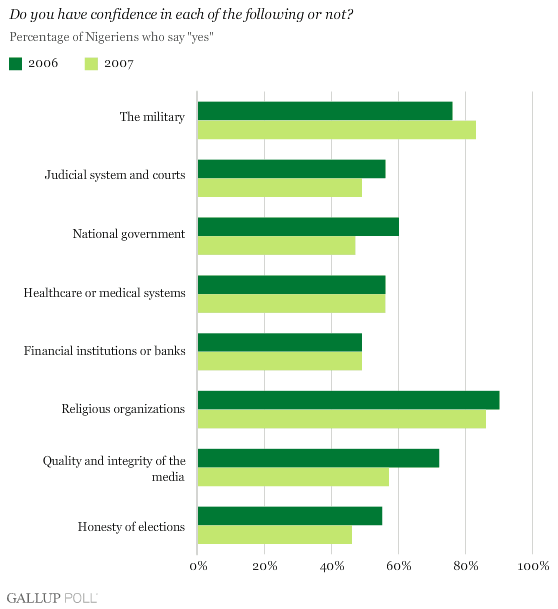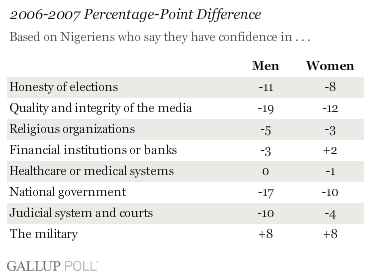WASHINGTON, D.C. -- Gallup Polls conducted in Niger find the public's confidence in two key institutions declined between 2006 and 2007.

In Niger, the media and the national government saw the largest drops in public trust. In 2007, 57% of Nigeriens told Gallup they had confidence in the quality and integrity of their media, which represents a 15-percentage-point decline from 72% in 2006. During the same period, Nigeriens' confidence in their government fell from 60% in 2006 to 47% in 2007, a 13-point drop.
Events that preceded Gallup's August 2007 survey may help explain these declines. In May 2007, Prime Minister Hama Amadou's government was dissolved, following a no-confidence vote by the National Assembly over embezzlement allegations against several ministers. The government also banned the press from reporting on the unrest that developed in northern Niger earlier that year, arresting at least 14 journalists. Interestingly, Nigeriens' perceptions of corruption in their government were virtually unchanged from the previous year, as two in three respondents (66% in 2007 and 69% in 2006) say it is widespread.
Between 2006 and 2007, Nigeriens grew somewhat less confident in the honesty of elections, which declined from 55% to 46%, and the judicial system, which dropped from 56% to 49%. Public confidence in the healthcare system (56% observed both years), financial institutions and banks (49% observed both years), and religious organizations (90% in 2006 versus 86% in 2007) is essentially unchanged between the two waves of data Gallup collected. The military, however, has experienced a small increase in public confidence. In 2006, 76% of Nigeriens said they had confidence in their military, compared with 83% who said the same in 2007.
Drop in Public Trust Greatest Among Men
While men and women generally express less confidence in the same national institutions, the decline in trust is more acute among the former than the latter. Men's confidence in the quality and integrity of the media fell 19 points from 72% to 53% between 2006 and 2007, while women's confidence registered an 12-point slide. Similarly, men were far less likely to express trust in the national government, as their confidence declined 17 points, while women's confidence fell 10 points.

Bottom Line
The Gallup Poll findings suggest that the dissolution of Niger's national government in 2007 had a negative effect on public opinion, especially among men, even though perceptions of corruption have remained the same. Furthermore, the findings show that Nigeriens are far less confident in the media, than they were previously, to report the news accurately and inform them. While Niger has implemented many institutional reforms to strengthen governance and fight corruption (the country has been on Freedom House's list of electoral democracies for nine consecutive years since 1999), the prosecution of high-profile corruption cases may be a step toward regaining the trust of the Nigerien public.
Survey Methods
Results are based on face-to-face interviews with 1,000 adults in Niger, aged 15 and older, in June 2006 and in August 2007. For results based on the total sample of national adults, one can say with 95% confidence that the maximum margin of sampling error is ±5 percentage points. In addition to sampling error, question wording and practical difficulties in conducting surveys can introduce error or bias into the findings of public opinion polls.